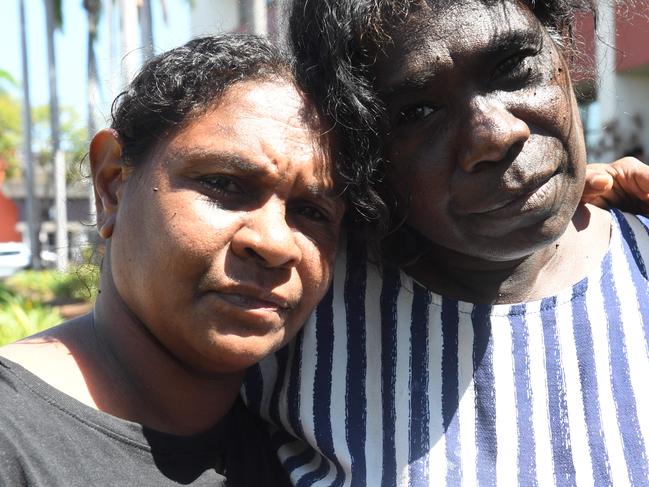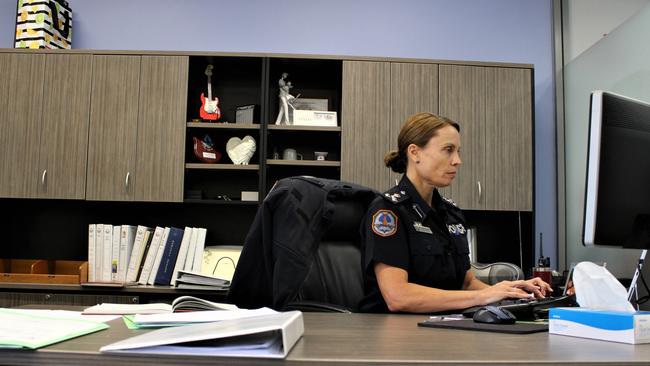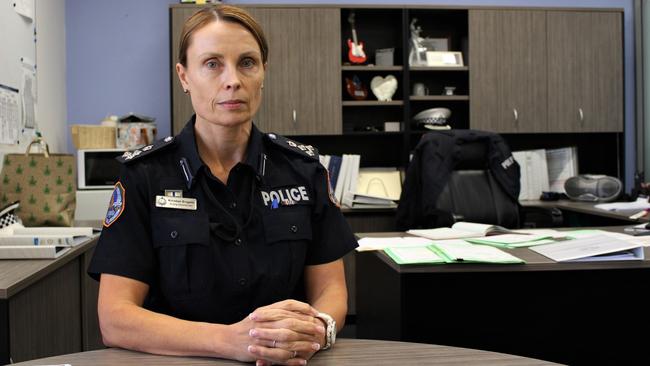NT Police’s new Family Harm Coordination Project boss says ‘the stuff we’re going to, it would blow your mind’. She reveals the huge toll domestic violence is taking on our community.
These words from Deputy Coroner Kelvin Currie came at the end of a two-day inquest into the death of Katherine woman, Roberta — referred to by her first name only at the request of her family — who was beaten to death by her partner Lorenzo Deegan in 2019.
Her tragic passing came just days after Roberta rang police pleading to be rescued from Deegan’s continued abuse, but the officers dismissed her complaints, later agreeing their response was “incredibly poor” and an opportunity to potentially save her life was missed.
NT Police says since then, it has listened and learned, and Roberta’s untimely death will not be in vain, as it continues to strive to ensure the mistakes of the past are not repeated.
In its latest response to the Territory’s “epidemic of domestic violence”, the force has launched a new Family Harm Coordination Project, with a pilot program commencing in Alice Springs and the southern region in November.
Detective Superintendent Kirsten Engels is the officer leading the project, and she says her team is taking a phased approach, beginning with an audit process to ensure responses to DV call-outs are consistent going forward.
“I have a team that looks through the last 24 hours and they go over the jobs and make sure that our response is in line with our policies and procedures and also to community expectations,” she says.

One of the key failings in the police response to Roberta’s cries for help was a lack of information sharing between agencies that could have raised red flags that might have prompted investigators to take her concerns more seriously.
Now, under the FHCP, Superintendent Engels says a top priority will be “to value add information that perhaps the officers going in didn’t know”.
“Everything’s great in retrospect but when an officer is called to a job, and they might only be a minute from the job, so they arrive there with little information, enough to get there and start unpacking what’s happening,” she says.
“But they might not appreciate the full extent of the domestic relationship, and in my eyes that doesn’t just include the information that police might have, but also relevant stakeholders.
“There’s very researched risk assessment tools that most other jurisdictions do use and that is on the premise that past behaviours are pre-indicators of a possible escalation in violence.”
Superintendent Engels says the project’s ultimate goal will be to form a “co-located multi-agency response to domestic violence”, while acknowledging not all victims will be comfortable disclosing to police.
“We’ve got issues with that, I think every police force does, some people would rather talk to a civilian, especially a specialist in domestic violence,” she says.
“They might need a legal person to help them through a civil application for a DVO, so the ultimate goal is to get to a point where we’re all multi-agency co-located and we can roll out the best response quickly.”
Another focus for the FHCP, Superintendent Engels says, will be on consistency of responses when complex cases present themselves, including recognising and dealing with situations of coercive control.
“So maybe when the troops are called to ‘somebody’s taking my money’, they might be looking at a theft of money, not find it and not really correlate that to ‘well that’s a part of a cycle’,” she says.
“It needs specialist eyes on it to make sure that, OK: Are we acting with consistency? And if we’re not, is it a cultural, training or a systemic issue? Is it something about our forms that we aren’t getting right? Are we not training people correctly, or is there a culture issue that we need to stamp out?
“But we won’t know until we start looking at them all, so my team is now gathering some amazing data to inform us what holes we might have and what things we are doing really well.”

In handing down her findings into Roberta’s death in June, Coroner Elisabeth Armitage said when the 29-year-old finally reached out to police during her ongoing ordeal, “they did nothing to help her”.
“To the contrary, the police members were rude to her and dismissed her complaints,” she said.
“They failed to follow any of their procedures concerning domestic violence complaints. The police told her not to call again and she did not.
“Two weeks after he found her and days after she reported him to police, Roberta was killed by Lorenzo.”
Deegan had already pleaded guilty to manslaughter prior to testifying at the inquest, with Justice Judith Kelly handing him a 10-year jail sentence in May 2020.
“Vulnerable women deserve what protection the law can give them,” she said at the time.
“Unfortunately it failed to protect (Roberta).”
With the FHCP now rolling out in Alice Springs, Superintendent Engels says “there were lessons to be learned” from what happened to Roberta, “and we’re taking them”.

“We’re absolutely taking them, and we’re running with ways to prevent that from occurring again, from developing training packages with external stakeholders who are specialists in training, we’re developing that, that will roll out,” she says.
“We have also seen that just giving people information when they’re going through recruit training is probably not enough, we actually need to reinforce the messages throughout their career.
“We don’t want people to get fatigued, however we have such a high rate of domestic violence jobs that our troops are going to that there is a danger of that.”
Like Roberta, Superintendent Engels says almost 90 per cent of victims of domestic violence in the NT are Indigenous, with Aboriginal women 40 times more likely to be hospitalised as a result.
“I mean that’s just huge,” she says.
“And the stuff we’re going to, it would blow your mind, the callous nature of the horrendous acts of domestic violence, it boggles my mind, how people can live through this.”
While still in its early days, it remains to be seen whether NT Police’s latest push to tackle one of the Territory’s most pernicious and intractable social issues will succeed, or whether, in Ms Armitage’s words, “the contagion of domestic violence rages unabated”.


Cops call for info over alleged Alice pub assault
A man has been hospitalised in Alice Springs after he was allegedly assaulted at a pub in town. Read the latest.
Man charged with murder after partner’s suspicious death
A 27-year-old man has been charged with murder after the suspicious death of a young Territory woman. Read the latest here.